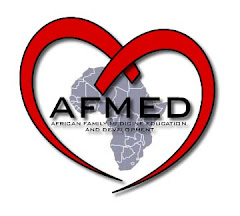The African Family Medicine Education and Development Initiative (AFMED) is a program to improve healthcare in rural and underserved areas of Sub-Saharan Africa by improving the quality and availability of African-based family medicine training. Through improved training and mentoring, family physicians can take a leading role in health care delivery in Africa. In this context, family medicine is uniquely positioned to provide, (1) Primary care and preventive services, (2) Curative inpatient and outpatient care, and, where necessary, (3) Surgical and advanced obstetrical care.
AFMED builds upon the fundamentals of family medicine, which emphasize evidence-based practice, cultural sensitivity, community outreach and care of the whole person. From this foundation, AMFED seeks to address the challenges of providing high-quality, on-site, post-graduate family medicine education in Africa through a collaborative effort emphasizing modern learning and communication technologies, pilot community hospital training, and sustainable partnerships between US- and Africa-based institutions and organizations.
As proposed, AFMED consists of three integrated phases to be implemented over three years, each building on the other and each strategically placed to insure program sustainability.
Phase 1.
A. Identification, review and adaptation of existing international family medicine training curricula now in existence to the health care needs and conditions in Africa.
B. Development of an Africa-specific model family medicine residency training curriculum integrated with a learning resource center in North Central Nigeria.
C. Development of an educational e-mail list serve and Web-site emphasizing maternal health, obstetrical care, and prevention of mother-to-child HIV transmission (PMTC).
D. Design, production, and distribution of Web-based learning tools specific for family medicine training in Africa.
E. Design, production, and distribution of CD/DVD-based learning tools, herein after refered to as multimedia tools, specific for family medicine training in Africa.
F. Network development between existing family medicine organizations and institutions in the United States with those in Africa.
G. Collaboration and network development with WONCA (World Organization of Family Doctors).
H. Dissemination and adaptation of existing family medicine journal and print materials.
Phase 2.
A. Design of a pilot family medicine curriculum delivered through state-of-the-art distance learning technologies.
B. Develop feasibility study and operational plan for faculty development and exchange between African- and US-based residency programs.
C. Development of AFMED Program Monitoring and Evaluation (M&E), Certification, and Accreditation.
Phase 3.
A. Plan for the dissemination of AFMED curriculum and technology to 10 additional English-speaking, Sub-Saharian African countries in need of upscaling post-graduate family medicine training.
B. Conduct an AFMED International Summit engaging key government and faith-based health care leaders to integrate family medicine specialty training into national health care development strategies.
Monday, February 18, 2008
Subscribe to:
Post Comments (Atom)

1 comment:
Ray and team,
Thank you for the update. I look forward to following you throughout your journey.
Ray,
We are all so proud of you and look forward to hearing about your experience firsthand.
I look forward to the day when I may be able to join you on one of your trips back to Nigeria
Jim
Post a Comment